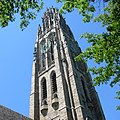Academics
As of 2021, the Macmillan Center currently offers degrees for both undergraduate and graduate levels. Undergraduate degrees include African Studies, East Asian Studies, Latin American Studies, Modern Middle East Studies, Russian and East European Studies, and South Asian Studies. Graduate degrees offered at the center include African Studies, East Asian Studies, and European and Russian Studies. [1]
Similarly, it is possible for graduating students to partake in a joint-degree program, where they can receive a master's. and an equivalent professional degree from one of four partnered Yale professional schools, with those being the Law School, the School of Management, the School of Public Health, and the School of the Environment. [2]
It is also possible for those to pursue a graduate certificate of concentration through the Councils on African, European, Latin American and Iberian, or Middle East Studies in conjunction with graduate-degree programs at the Graduate School of Arts and Sciences or the professional schools. [3]
Affiliated centers and institutes
Gilder Lehrman Center for the Study of Slavery, Resistance, and Abolition
The Gilder Lehrman Center for the Study of Slavery, Resistance and Abolition was founded in November 1998 by David Brion Davis and funded by Richard Gilder and Lewis Lehrman, founders of the Gilder Lehrman Institute of American History. [7] Davis served as director till June 2004, [8] when historian David. W. Blight, Sterling Professor of American History at Yale University, succeeded him as current director as of 2021. [9]
The center's mission is to promote the study of all aspects of slavery and its legacy, with focus on the chattel slave system and its destruction. The center seeks to foster an improved understanding of the role of slavery, slave resistance, and abolition in the Western world by promoting interaction and exchange between scholars, teachers, and public historians through publications, educational outreach, and other programs and events. [10] In addition, the center offers postdoctoral and faculty fellowships and summer graduate research fellowships, and also sponsors the Frederick Douglass Book prize, an award for most outstanding non-fiction book in English on the subject of slavery, resistance, and/or abolition for the year it is given. [11] [12]
Center for Historical Enquiry & the Social Sciences
The Center for Historical Enquiry & the Social Sciences provides insight on the interplay between history and the present, focusing on large-scale social transformations and solutions to difficult social crises and problems. The center serves as a bridge between the humanities and social sciences in order to "better understand the world we live in." [13]
Center for the Study of Representative Institutions
The Yale Center for the Study of Representative Institutions serves as an interdisciplinary pilot program with the intention of developing the study of the theory and practice of representative government in the Anglo-American tradition. It is supported by the Thomas W. Smith fund and the Jack Miller Center's Commercial Republic Initiative, sponsored by the John Templeton Foundation. [14]
This page is based on this
Wikipedia article Text is available under the
CC BY-SA 4.0 license; additional terms may apply.
Images, videos and audio are available under their respective licenses.

